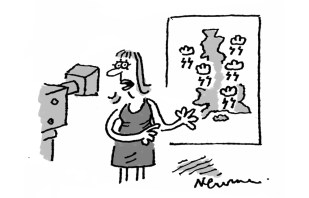Not so long ago we went to politicians for politics and comedians for comedy. Today, like many others, I watch politicians for amusement and listen to comedians for their political insights.
Whenever I want cheering up, I watch Kamala Harris riffing on a theme of her choice, or sometimes a Labour politician trying to explain why a woman can have a penis. By contrast Joe Rogan analyses political questions better than any of them, as does Noam Dworman, of New York’s Comedy Cellar.
So it was that when the question of free speech returned again recently, I did not turn to the hilarious Justice Secretary Shabana Mahmood, but instead to the sombre and sage Rowan Atkinson.
It is ‘the plebs’ who have been marched to court sharpish during the speeding up of our justice system
Readers may recall that some years back both Labour and a Tory-Lib Dem coalition government tried to keep a law that made ‘insulting’ speech a criminal offence. The person who made the best case against this was Atkinson, who gave a speech in one of the committee rooms in parliament which showed a more astute sense of politics and principle than anything that had occurred in that place for years. While our present government tries desperately to crack down on social-media users, one part of Atkinson’s warnings is especially pertinent.
He noted: ‘I am personally highly unlikely to be arrested for whatever laws exist to contain free expression, because of the undoubtedly privileged position that is afforded to those of a high public profile. So, my concerns are less for myself and more for those more vulnerable because of their lower profile. Like the man arrested in Oxford for calling a police horse gay. Or the teenager arrested for calling the Church of Scientology a cult. Or the café owner [given a police caution] for displaying passages from the Bible on a TV screen.’
Recently I have been thinking of Atkinson’s wise words while following the cases brought against those who have been prosecuted for things they’ve said online. For instance, it is impossible not to notice that it is indeed ‘the plebs’ who have been marched to court sharpish during the unexpected speeding up of our justice system in the wake of this month’s riots. They include people like Bernadette Spofforth, a 55-year-old mother of three who, shortly after the Southport attack, rather got over her skis. Specifically she was one of those excitable people (and I will never understand why people do this) who wanted to name the suspect in the killings of the three little girls before anyone else did. She oongly repeated an internet rumour (though caveating it with ‘if this is true’) that the suspect was a man called Ali Al-Shakati who was on an MI6 watchlist and had arrived in the UK by boat last year.
Of course she was wrong, though the glee with which certain people celebrated those like her being wrong was something to behold. After all, there have been plenty of people with similar names on terror watchlists who have arrived here and carried out acts of terror soon afterwards. The Parsons Green, Reading and London Bridge attackers are a few examples. It’s just the Southport suspect wasn’t one of them.
In any case, Ms Spofforth is out on bail pending further inquiries. All this despite her acknowledging that her tweet was ‘a spur-of-the-moment, ridiculous thing to do’. Nevertheless, the same police forces that have not solved a burglary in half of the country for years are now policing unwise things people are saying online.
One oddity about this is, once again, the two-tier nature of the pursuit. People like Nick Lowles, from the incorrectly named far-left campaign group Hope Not Hate, also published fake information online. That particular dolt passed around a claim (swiftly shown to be false) that a Muslim woman in Middlesbrough had had acid thrown at her from a car window. The post was seen by more than 100,000 people and led to Muslim men appearing on the streets in the belief that they had to defend their areas from racist acid-attack monsters.
Yet so far as I know Mr Lowles has not had his collar felt, perhaps because he enjoys the government’s favour, as well as backing from prominent left-wing philanthropists such as Trevor Chinn. Kenan Malik of the Observer similarly passed around misleading reports in print and online this week, but also seems strangely immune from the law.
Lord Bingham famously said in 2006: ‘The law must be accessible and so far as possible intelligible, clear and predictable.’ The government’s attempts to crack down on this month’s spontaneous and grass-roots riots is anything but intelligible, clear or predictable. Perhaps because (and this may be controversial, but it nevertheless seems true) there is no evidence the disorder was centrally organised. What appears to scare the authorities and much of the media is that the lawlessness was spontaneous and uncoordinated – something the ‘anti-fascists’ hoping to have street clashes with some British Nazi party appear rather disappointed about.

Meanwhile the uneven and unpredictable application of the law continues. Just last month, on arriving into office, Mahmood warned that UK prisons faced a ‘total collapse’ due to overcrowding, and that Britain risked ‘a total breakdown of civil law and order’, before announcing she would release thousands of inmates early.
Yet just weeks later, this threat of overcrowding seems to have magically disappeared. Indeed Mahmood appears intent on overseeing the locking up of any low–profile ‘pleb’ who has ever tweeted something incorrect or distasteful online.
I do not doubt that she, Keir Starmer and others will continue to give us all a laugh as they struggle at their jobs. But couldn’t someone arrange for Rowan Atkinson to become justice secretary?








Comments